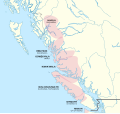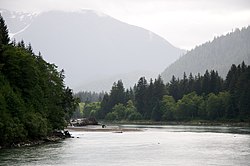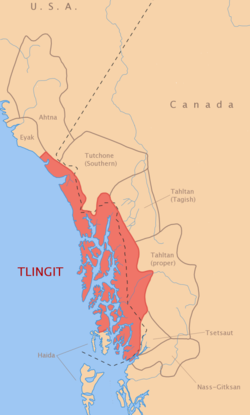The Haisla language (Haisla: X̄aʼislak̓ala / X̌àh̓isl̩ak̓ala, [ˈχaʔislakʼala]) is a First Nations Wakashan language spoken by the Haisla people of the...
20 KB (1,815 words) - 09:41, 4 February 2025
Haisla people (Haisla: x̄á’isla, lit. 'dwellers downriver') are a First Nation who reside in Kitamaat. The Haisla consist of two bands: the Kitamaat people...
24 KB (3,205 words) - 19:22, 11 April 2025
Haisla may refer to: Haisla people, an indigenous people living in Kitamaat, British Columbia, Canada. Haisla language, their northern Wakashan language...
267 bytes (63 words) - 16:52, 12 October 2018
française [lɑ̃ɡ fʁɑ̃sɛːz] ) is a Romance language of the Indo-European family. Like all other Romance languages, it descended from the Vulgar Latin of the...
137 KB (13,474 words) - 19:55, 1 June 2025
Gʼpsgolox totem pole (redirect from Haisla G’psgolox pole)
totem pole was a nine-metre-high mortuary pole that was made in 1872 by the Haisla people on the shore of Douglas Channel in British Columbia, Canada. In 1929...
7 KB (839 words) - 17:45, 9 May 2025
or Anishinaabemowin, is an indigenous language of North America of the Algonquian language family. The language is characterized by a series of dialects...
79 KB (8,322 words) - 17:28, 16 May 2025
or Huchsduwachsdu Nuyem Jees ("source of milky blue waters") in the Haisla language, is a conservancy located on the Pacific coast of the province of British...
7 KB (764 words) - 17:56, 26 June 2023
An endangered language is a language that it is at risk of falling out of use, generally because it has few surviving speakers. If it loses all of its...
20 KB (321 words) - 14:33, 10 April 2025
American Sign Language (ASL) is a natural language that serves as the predominant sign language of Deaf communities in the United States and most of Anglophone...
72 KB (8,111 words) - 03:51, 19 May 2025
languages: diitiidʔaaʔtx̣ Haisla Haíɫzaqv Kwakʼwala nuučaan̓uɫ ’Wuik̓ala Plateau Sign languages: ʾa·qanⱡiⱡⱡitnam Secwepemcékst First Language of Nova Scotia 200...
195 KB (14,251 words) - 03:34, 25 May 2025
group of Haisla, now part of the Haisla Nation government and community at Kitamaat Village near Kitimat. The name is a Tsimshian language reference...
4 KB (301 words) - 18:18, 3 October 2024
consists of seven languages: Wakashan Northern Wakashan (Kwakiutlan) languages Haisla (also known as Xaʼislak'ala, X̌àh̓isl̩ak̓ala or Haisla-Henaksiala, with...
13 KB (1,363 words) - 21:36, 12 May 2025
Brent Galloway (category Linguists of Salishan languages)
and 1977, respectively. He conducted linguistic field work with the Haisla language, Upriver Halkomelem (from 1970), and Nooksack (from 1974). In the case...
6 KB (623 words) - 04:08, 5 March 2025
The Haisla Nation is the Indian Act-mandated band government which represents the Haisla people in the North Coast region of the Canadian province of British...
4 KB (390 words) - 17:15, 10 February 2025
The Miꞌkmaq language (/ˈmɪɡmɑː/ MIG-mah; Mi'kmaq: [miːɡmax]), or Miꞌkmawiꞌsimk, is an Eastern Algonquian language spoken by nearly 11,000 Miꞌkmaq in Canada...
38 KB (3,370 words) - 12:48, 25 May 2025
province of Hainan Haisla – X̄a'islak̓ala, X̌àh̓isl̩ak̓ala Spoken in: British Columbia , Canada Haitian Creole – Kreyòl Ayisyen Official language in: Haiti Hakha...
236 KB (15,207 words) - 15:53, 30 May 2025
phonology, Haisla language Baker, Mark (United States, 1959–), Mohawk language, generative grammar Bally, Charles (Switzerland, 1865–1947), French language, phraseology...
78 KB (6,911 words) - 13:29, 21 May 2025
Japan. His interests included syntax, phonology, the languages of British Columbia (especially Haisla), problems of tense and aspect in semantics, and formal...
12 KB (987 words) - 09:32, 6 January 2025
Inuktitut (redirect from Inuktitut (language))
aboriginal languages written with Canadian Aboriginal syllabics. It is recognized as an official language in Nunavut alongside Inuinnaqtun and both languages are...
39 KB (3,277 words) - 15:44, 14 April 2025
Kwakwakaʼwakw (redirect from Haisla Kwakiutl)
Kwakʼwala. These peoples, incorrectly known as the Northern Kwakiutl, were the Haisla, Wuikinuxv, and Heiltsuk. Many people who others call "Kwakiutl" consider...
36 KB (4,130 words) - 19:58, 31 May 2025
The Blackfoot language, also called Siksiká (/ˈsɪksəkə/ SIK-sə-kə; Blackfoot: [sɪksiká], ᓱᖽᐧᖿ), is an Algonquian language spoken by the Blackfoot or Niitsitapi...
58 KB (5,895 words) - 09:56, 2 June 2025
Argillite Carvings Haida language Haida manga Haida mythology Haisla language Head-Smashed-In Buffalo Jump Heiltsuk language Hereditary chiefs in Canada...
24 KB (2,602 words) - 04:33, 10 April 2025
The Tsuutʼina language, or Tsúùtʼínà Gūnáhà (and formerly known as Sarcee or Sarsi),: 2 is spoken by the people of the Tsuutʼina Nation, whose reserve...
12 KB (1,013 words) - 10:19, 3 June 2025
Chinook Jargon (redirect from Chinook Jargon use by English-language speakers)
Wawa, also known simply as Chinook or Jargon) is a language originating as a pidgin trade language in the Pacific Northwest. It spread during the 19th...
56 KB (5,808 words) - 14:46, 4 June 2025
Haida /ˈhaɪdə/ (X̱aat Kíl, X̱aadas Kíl, X̱aayda Kil, Xaad kil) is the language of the Haida people, spoken in the Haida Gwaii archipelago off the coast...
72 KB (6,761 words) - 01:59, 22 April 2025
The Tlingit language (English: /ˈklɪŋkɪt/ KLING-kit; Lingít Tlingit pronunciation: [ɬɪ̀nkɪ́tʰ]) is an Indigenous language of the northwestern coast of...
49 KB (5,064 words) - 22:15, 6 June 2025
Wôbanakiak, is an endangered Eastern Algonquian language of Quebec and the northern states of New England. The language has Eastern and Western forms which differ...
60 KB (6,439 words) - 00:05, 11 May 2025
known as Cree–Montagnais–Naskapi) is a dialect continuum of Algonquian languages spoken by approximately 86,475 people across Canada in 2021, from the...
55 KB (4,258 words) - 09:25, 6 June 2025
Slavey (/ˈsleɪvi/; also Slave, Slavé) is a group of Athabaskan languages and a dialect continuum spoken amongst the Dene peoples of Canada in the Northwest...
33 KB (3,306 words) - 13:41, 22 April 2025




















